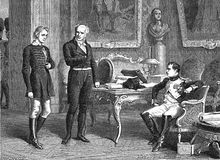Treaty of Schönbrunn

The Treaty of Schönbrunn (French: Traité de Schönbrunn; German: Friede von Schönbrunn), sometimes known as the Peace of Schönbrunn or the Treaty of Vienna, was signed between France and Austria at Schönbrunn Palace near Vienna on 14 October 1809. The treaty ended the Fifth Coalition during the Napoleonic Wars, after Austria had been defeated at the decisive Battle of Wagram on 5–6 July.
Prelude
During the
These attempts ultimately failed, after French forces occupied Vienna in May 1809. The Austrians under
Terms

France imposed harsh peace terms: Austria had to cede the
Austria recognized Napoleon's previous conquests from other nations as well as the rule of his brother
Austria also had to apply Napoleon's Continental System, as Britain remained at war with France. One contemporary British view on the treaty was:
This Treaty is certainly one of the most singular documents in the annals of diplomacy. We see a Christian King, calling himself the father of his people, disposing of 400,000 of his subjects,[1] like swine in a market. We see a great and powerful Prince condescending to treat with his adversary for the brushwood of his own forests.[2] We see the hereditary claimant of the Imperial Sceptre of Germany not only condescending to the past innovations on his own dominions, but assenting to any future alterations which the caprice or tyranny of his enemy may dictate with respect to his allies in Spain and Portugal, or to his neighbours in Italy.[3]—We see through the whole of this instrument the humiliation of the weak and unfortunate Francis, who has preferred the resignation of his fairest territories to restoring to his vassals their liberties, and giving them that interest in the public cause which their valour would have known how to protect.—O, the brave and loyal, but, we fear, lost Tyrolese!
— The Gentleman's Magazine (1809).[4]
Though considerably weakened, Austria remained a European great power. Emperor Francis I approached to the French by marrying his daughter Marie Louise off to Napoleon (whom she at first detested) in 1810. As a result of Metternich's change of policies, the Austrian forces joined the French invasion of Russia in 1812.
Assassination attempt

During the negotiations at Schönbrunn, Napoleon narrowly escaped an attempt on his life. On 12 October, shortly before signing the treaty, the emperor exited the palace with a large entourage to observe a military parade. Seventeen year old Friedrich Staps, son of a Lutheran pastor from Naumburg, had arrived in Vienna and demanded an audience to present a petition. He was refused by the emperor's aide General Jean Rapp, who shortly thereafter observed Staps in the courtyard pushing through the crowd towards Napoleon from a different direction, and had him arrested.
Taken to the palace, Staps was found to be carrying a large kitchen knife inside his coat, concealed in the petition papers. Interrogated, Staps frankly revealed his plans to kill the emperor, calling him the misfortune of his country. Brought forward to Napoleon, he asked whether Staps would thank him if he was pardoned, to which Staps replied: "I would kill you none the less."
Napoleon left Vienna on 16 October and the next day Staps was shot by Württemberg fusiliers outside the palace. At this execution, he is said to have shouted "Long live freedom! Long live Germany!"[5][6] Napoleon, impressed and fearing a greater conspiracy, instructed his police minister Joseph Fouché to keep the incident secret.
Soon after the German campaign of 1813, Staps came to be seen as a martyr of the burgeoning German nationalism. He was the subject of a poem by Christian Friedrich Hebbel and a play by Walter von Molo.
References
- ^ See Article 1.5
- ^ See Article 1.1
- ^ See Article 15
- ^ The Gentleman's Magazine,volume 79 part 2, F. Jefferies, 1809 p. 1065
- ^ Stammbaum der Familien Wislicenus: Friedrich Staps Archived 2008-06-11 at the Wayback Machine
- ^ L'attentat de Staps
